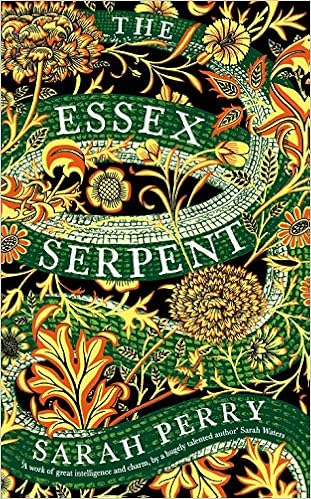Book #47
The Essex Serpent by Sarah Perry
Set in Victorian London and an Essex village in the 1890's, and enlivened by the debates on scientific and medical discovery which defined the era, The Essex Serpent has at its heart the story of two extraordinary people who fall for each other, but not in the usual way.They are Cora Seaborne and Will Ransome. Cora is a well-to-do London widow who moves to the Essex parish of Aldwinter, and Will is the local vicar. They meet as their village is engulfed by rumours that the mythical Essex Serpent, once said to roam the marshes claiming human lives, has returned. Cora, a keen amateur naturalist is enthralled, convinced the beast may be a real undiscovered species. But Will sees his parishioners' agitation as a moral panic, a deviation from true faith. Although they can agree on absolutely nothing, as the seasons turn around them in this quiet corner of England, they find themselves inexorably drawn together and torn apart.
The only thing this novel has going for it is its incomprehensibly stunning cover.
Perry promises a gothic tale of Victorian rumour, panic, love, and unlikely alliances. What she delivers is a droll, plotless story, serving no real purpose other than to allow Perry moments of lyrical poignancy in the form of a simile poorly supporting every second sentence.
Our recently widowed protagonist, Cora, is intended to be portrayed as an independent ‘modern’ woman. Casting off the ties that bound her during marriage, she begins dressing in men’s clothes, discards personal grooming, and loudly explains to anyone who will listen how liberating it is to forget to be a woman. I had a lot of problems with this.
Cora, alongside every single other character, was loathsome and incomprehensible. I couldn’t get on board with anyone’s motives or justifications, cared not for their thoughts and feelings, and muttered in disdain on more occasions than I’d like to admit. A band of beige cretins, each of them seemed to be placed into the novel purely to serve a purpose, rather than to be themselves explored.
Although by no means an expert, Victorian fiction is one of my favourites – the era fascinates me; there was something really not quite right about Perry’s Victorian London. The lack of research and care was apparent, and more time should have been spent on specifics; some of the time you could’ve been excused for assuming the section you were reading was set in 2010. The letters, the dialogue, even the descriptions of food and clothing, were well off the mark, and horrified me.
My other serious issue was the need for there to be any type of love triangle here. It was pointless and unresolved; Perry seems here to be commenting on how love can take over us at any moment, but why not the love of friendship? Why do all main characters have to end up shagging each other at some point? I also could have done without the image of the Good Revered wanking into a field, but the damage has been done.
There are so many things about this I dislike. The serpent itself caused so much panic within the area, however none of this was probed or discussed in detail by Perry. There was even a moment of hysteria in the classroom which excited me at the time, but which fell flat as we became embroiled again in the futile overarching theme of romance.
I won’t go on (although I could go on for quite some time on this one). All I can say to conclude is that I’m utterly shocked at the praise that has been loaded on this novel, and truly feel Perry has done a disservice to a wonderful premise.

